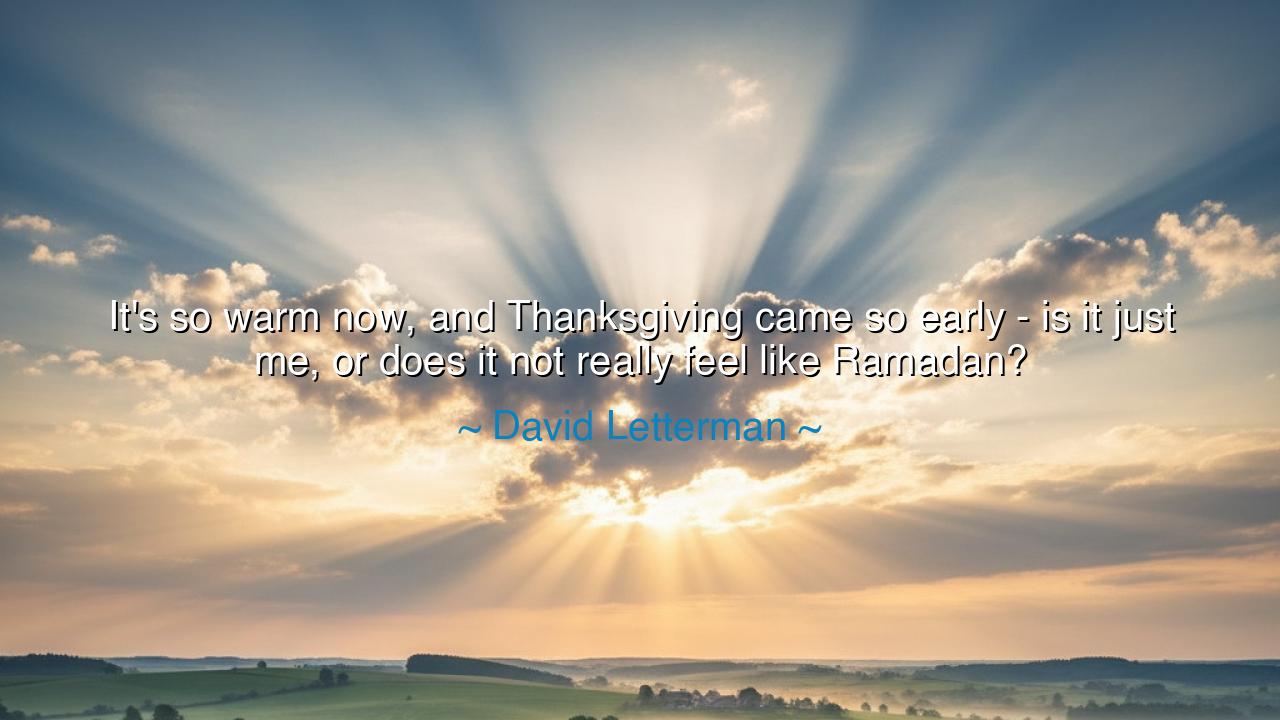
It's so warm now, and Thanksgiving came so early - is it just
It's so warm now, and Thanksgiving came so early - is it just me, or does it not really feel like Ramadan?






David Letterman, ever the jester with a sharp edge of truth, once quipped: “It’s so warm now, and Thanksgiving came so early—is it just me, or does it not really feel like Ramadan?” Though wrapped in humor, this remark reveals something deeper than laughter: a meditation on time, on seasons, and on the strange dissonance between ritual and reality. For when the expected rhythms of life falter—when a holiday arrives before its time, or the weather mocks tradition—the heart feels unmoored, and even the sacred feasts seem foreign.
The origin of this quote lies in Letterman’s long career as a late-night host, where he often wielded irony to reveal hidden truths about culture. By weaving together Thanksgiving, the American feast of gratitude, and Ramadan, the Muslim month of fasting and reflection, he drew a comic comparison that was also profound. He suggested that the essence of a celebration is bound not only to ritual but to atmosphere—the chill of autumn, the turning of the leaves, the slow approach of winter. When those cues vanish, the holiday feels out of joint, and the spirit of the feast seems displaced.
This dissonance is not new. In ancient Rome, when the calendar slipped out of alignment with the seasons, festivals meant for spring were celebrated in winter, and the people felt the strangeness keenly. Likewise, in the medieval world, when Easter or harvest festivals fell at unusual times due to shifting moons, peasants would remark that the earth itself seemed confused. The human heart longs for harmony between nature’s rhythms and sacred observances; when they diverge, laughter often masks unease.
Letterman’s use of Ramadan is particularly striking, for it reminds us that holidays are not universal in date or season. Ramadan, moving with the lunar calendar, falls sometimes in the heat of summer and sometimes in the chill of winter, shaping the experience of fasting in radically different ways. By mentioning it alongside Thanksgiving, Letterman highlights the universal truth: rituals are tied not only to tradition but also to the felt reality of the world around us. When that reality shifts, our connection to the ritual feels altered, and we are forced to ask what the true essence of the observance is.
Yet this very discomfort is a source of wisdom. For it teaches that the heart of a celebration lies not in the weather nor in the calendar alone, but in the meaning we carry into it. Thanksgiving is gratitude, no matter the warmth of the day. Ramadan is reflection and devotion, no matter the length of the fast. When outer signs confuse us, the task is to look inward, to find the true essence, and to anchor ourselves in what does not change.
History shows us examples of this resilience. During World War II, soldiers celebrated Thanksgiving on foreign soil, sometimes under burning sun, sometimes in bitter cold, with rations instead of feasts. Yet they still bowed their heads in gratitude, proving that the spirit of the holiday could endure even when all outward signs were absent. Likewise, Muslims in lands where daylight stretches long into night still keep the fast of Ramadan, adapting yet remaining faithful. In these examples, the eternal core of tradition outshines the shifting seasons.
The lesson, then, is clear: do not let outward conditions dictate inner devotion. Holidays may fall early or late, the weather may mock expectation, the calendar may confuse, but the essence of gratitude, faith, and reflection remains constant. Instead of saying, “It does not feel like Thanksgiving,” or “It does not feel like Ramadan,” let us say, “I will bring the spirit of gratitude and devotion with me, whatever the season.” For true celebration begins not in the sky or soil, but in the steadfast heart.
So, O listener, take David Letterman’s jest as hidden wisdom. Laugh, yes, at the strangeness of holidays that feel displaced. But do not stop at laughter—look deeper. Ask yourself: what is the essence of this day? What is the unchanging spirit beneath its shifting forms? And then, whether in warmth or cold, in plenty or want, in early autumn or deep winter, live the truth of the feast. For seasons pass, but meaning endures. This is how every day may become holy, and every feast may truly be felt.






AAdministratorAdministrator
Welcome, honored guests. Please leave a comment, we will respond soon